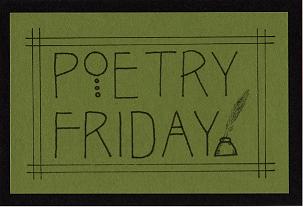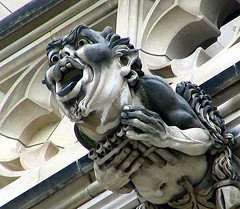How can it be Poetry Friday again? Well, in honor of PF, and because I am currently in Vermont with a lot of other faculty and Board members, trying to help out Vermont College of Fine Arts with some strategic planning sessions (we're asking ourselves to brainstorm the future now VCFA is finally INDEPENDENT - three huge cheers HOORAY!!) I am going to post a few quotations about poetry which I always hand out to my students during our VCFA residencies.I title this hand-out "Things to Think About Before You Sit Down to Write a Poem." This is longer than usual, but I offer it up in case any of these resonate with you. And at the end is a link to Vermont College of Fine Arts, and our wonderful MFA Writing for Children program. The website is being re-designed, so look for a much-improved version by the end of the year.)
Things to Think About Before You Sit Down to Write a Poem
1. “God is in the details.”
Something I believe wholeheartedly – often attributed to the architect Mies Van Der Rohe, though also attributed to Gustave Flaubert, who is also credited with saying “The Devil is in the details,” just to muck us up.
2. “Carving is easy. You just go down to the skin and stop.” (Michelangelo)
This reminds me that artists need to know when to stop. It also reminds me that only geniuses seem to think that knowing where to stop (determining where the skin begins and the marble stops) is easy. It also makes me think about how even a [poem has a skin, an outer edge, beyond which the writer need not go. Let the reader interpret what lies beneath. Give your reader the skin. Then let go.
3. “Increasingly I have felt that the art of writing is itself translating, or more like translating than it is like anything else. What is the other text, the original? I have no answer. I suppose it is the source, the deep sea where ideas swim, and one catches them in nets of words and swings them shining into the boat ... where in this metaphor they die and get canned and eaten in sandwiches.” (Ursula Le Guin)
Though I love the first half of this thought, in terms of all language being a kind of translation (I agree), I’m most fond of the turn at the end, where Le Guin finds herself caught by her own shimmering metaphor and chooses to come back to the world of tuna fish sandwiches. Let’s not get too high-minded and poetic about all of this.
4. “…the main concern of the fiction writer is with mystery as it is incarnated in human life.” (Flannery O’Connor – who practiced what she preached.)
Though O'Connor speaks to fiction writers, I think it means even more to poets. If we could just keep in our minds, while we write - the idea of mysteries made flesh, we would stop trying to over explain. (see #2, above.)
5. “Poetry is the most direct and simple means of expressing oneself in words: the most primitive nations have poetry, but only quite well developed civilizations can produce good prose. So don’t think of poetry as a perverse and unnatural way of distorting ordinary prose statements: prose is a much less natural way of speaking than poetry is. If you listen to small children, and to the amount of chanting and singsong in their speech, you’ll see what I mean.” (Northrop Frye)
I’ve always believed people who want to write poetry (whether for children or adults) should simply go eavesdrop on a playground. But I like this quotation because it says something else as well. Many writers believe that poetry is language that has been artificially torqued and manipulated, and that prose is the most natural (thus, easiest?) of forms for our thoughts, but the effort to state what we think in an articulate and organized manner (witness the effort involved in writing a good essay) is extremely difficult. My advice to many writers is to read The Best American Essays each year and study the strategies of people who handle prose with precision and beauty. (I also advise writers to read Northrop Frye.)
6. “But the Devil whoops, as he whooped of old: ‘It’s clever, but is it Art?’ ” (Rudyard Kipling)
This one reminds me that there’s a point beyond which being witty just doesn’t fly. I don’t follow this advice as often as I should. But I wish I did - being clever is never enough. Messing around with rhythm, sound and form is fun, but the most essential thing to remember is that I should have something authentic to say.
7. “The miracle is not to fly in the air, or to walk on the water, but to walk on the earth.”
(Chinese proverb)
We are accustomed to the Marvelous Unreal. But the Marvelous Real? How do we do that? How do we walk on the earth and make it magic?
8. “What I like in a good author is not what he says, but what he whispers.” (Logan Pearsall Smith)
Remember: Be subtle. Trust your reader to understand – to hear the subtext, the whisper.
9. “But mark, madam, we live amongst riddles and mysteries—the most obvious things, which come in our way, have dark sides, which the quickest sight cannot penetrate into; and even the clearest and most exalted understandings amongst us find ourselves puzzled and at a loss in almost every cranny of nature’s works.” (Lawrence Sterne)
A continuation of Numbers 4 and 7, I think – and my obsession: mystery.
10. “Both poet and painter want to reach the silence behind the language, the silence within the language. Both painter and poet want their work to shine not only in daylight but (by whatever illusionist magic) from within.” (Howard Nemerov)
You don’t really think of silence as a writer’s goal. But it’s there.
11. “When it came to poetry, my father was not an absolutist. Pie was his favorite subject for a couplet, but every three or four weeks he would write about something else….” (Calvin Trillin)
This quotation I keep on my computer. It reminds me to laugh. Reminds me poetry means different things to different people. Reminds me not to get in a Pie rut.
Vermont College of Fine Arts(We're in the process of redesigning our website - a better site soon!)
And the Poetry Roundup this week is being hosted over at
Two Writing Teachers.










































